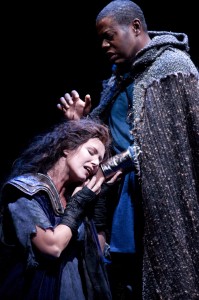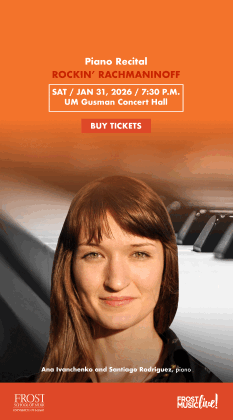Soprano soars in Seattle “Elektra”
SEATTLE: The squawking winds and ominous rumblings of brass emanating from the pit during pre-curtain warm-ups give an early hint that this will be no tame evening at the opera.
Far from it: the production of Elektra currently under way at Seattle Opera http://www.seattleopera.org/tickets/production.aspx?productionID=60″> stands out as one of the company’s most compelling offerings in recent seasons. Much of that success has to do precisely with what transpires in the pit throughout the relentless one-act drama, but the linchpin here is the richly textured interpretation of the title role by American soprano Janice Baird. Along with a high percentage of the cast, Baird makes an auspicious company debut. Her accomplishment has only inflated the sense of anticipation for Baird’s upcoming turn as Brunnhilde in 2009’s recast “green” Ring.
It’s been almost exactly a century since audiences first experienced Strauss’s operatic shocker. “Shocker” not in the Joseph Kerman/Tosca/“shabby” sense, but as a fundamentally gripping psychological portrayal that has lost little of its aura despite decades of routine, popularized violence on film and TV. The original reception naturally generated (forgive the pun) the usual silly commentary—a contemporary cartoon illustrated the composer as an executioner tormenting his victim with a trumpet while the latter is strapped to an “Elektric chair” for example—but there were also highly perceptive reactions. “At the conclusion of Salome,” observed the critic Paul Bekker, “everything is left in a state of breathless excitement, while the end of Elektra produces only a feeling of grateful relief.”
The potential for intensification by music is first and foremost what attracted Strauss to Hugo von Hofmannsthal’s 1903 play. (Its success as an opera has in fact obscured how original, with its highly wrought web of imagery involving dreams, wild animals, even the colors of blood, was Hofmannsthal’s adaptation of Sophocles, initially produced in Berlin by Max Reinhardt.) Conductor Lawrence Renes (who is also making his Seattle Opera debut) shows himself thoroughly in tune with what Hofmannsthal once described as Elektra‘s “mixture of dark and bright.” From another angle, this entails the score’s alternation between high tension and lyrical relaxation (a pattern already laid out in Elektra’s first monolog). Renes gives even the most plushly lyrical lines of divided strings a nervous edge, as if to signal that it’s never safe to let down our guard. He also gives space for Strauss’s telling details—the jangling of Klytemnestra’s jewels and charms, the snapping phrases of scorn from the low winds—to register.
Baird avoids the trap of seeming already over the edge—and hence with little left to discover about her—too early in the game. Her large, expressive vocalism adapts to the shifting spectrum of Elektra’s moods as she takes stock of her situation at each step: feral determination in her ritualistic communion with her dead father, cynical mockery of Chrysothemis’s ability to compromise, utter devastation and then elation regarding Orest’s fate, and nihilistic triumphalism when her goal is achieved. Baird’s tireless instrument leaves her plenty of energy to amplify with a powerful range of gestural language (only the death-dance itself seems to lack the last measure of mania).
Baird has good company in Irmgard Vilsmaier’s voluptuously phrased Chrysothemis, who convincingly embodies the strength with which her sister credits her. Rosalind Plowright’s Klytemnestra is memorably chilling in her combination of hauteur and abject fear. The homecoming of Alfred Walker’s firmly sung Orest has little warmth but, in its place, keeps the murderous momentum of the siblings on a riveting track. Aegisth, sung by Richard Margison, wonderfully mimics his consort’s demented pride in a brief scene replete with some much-needed gallows humor (though, one suspects, the audience laughter elicited by Elektra’s anguished cry when Orest first enters the palace—“I forgot to give him the ax!”—was not intended). A standout among the Maids (whom we see in the first stage picture madly scrubbing away on the courtyard flagstones) is Cynthia Jansen’s vehemently opinionated ringleader of the gossips.
Elektra was last given by Seattle Opera in 1996. The current production retains the original sets by Wolfram Skalicki, which, curiously enough, seem to foreshadow a certain tomb-ridden, highly claustrophobic visualization of mythic antiquity that was also favored in the company’s Met co-production of last season, the Stephen Wadsworth-directed Iphigénie en Tauride. Has someone been suggesting rereading Nietzsche on the darker, pre-Socratic aspects of Greek antiquity? (I even wondered whether D.C.A. Hillman’s The Chemical Muse—http://us.macmillan.com/thechemicalmuse a recent controversial study of drug use among the ancients–might have figured on the suggested reading list, given the overall stage demeanor that seemed to prevail.)
Enlivening Skalicki’s sets is remarkably imaginative lighting by Marcus Doshi. In perfect sympathy with Strauss’s score, he realizes the opera demands various kinds of darkness rather than a monolithically oppressive gloom. The light crescendo in the climactic scene is almost synesthetic in its impact. The costumes by Melanie Taylor Burgess provide dramatic extensions of their personalities, from Klytemnestra’s decadently adorned retinue to the starkly hooded figure Orest presents.
Less convincing is director Chris Alexander’s compulsion to spell out in excess what is so richly contained already within the music and the performances of this fine cast. Alexander’s ability to focus on mood is highly effective—in her first monolog, we immediately realize Agamemnon is actually still alive in his daughter’s psyche—but his interventions offer diminishing returns. When Chrysothemis exclaims to Elektra of the scars time engraves on their faces, we see her actually pull out a mirror from a handy makeup kit, with which she later dolls herself up during the climactic palace coup at the end (she is, after all, determined to find herself a man). In a truly distracting gambit, Alexander stages an almost-consummated human sacrifice as Klytemnestra makes her entrance, leaving the high priest with blade held aloft in a group tableau. If ever an opera doesn’t require overdetermined staging, it’s Elektra.
Thomas May writes frequently about the arts. His books include Decoding Wagner http://www.amazon.com/Decoding-Wagner-Invitation-World-Music/dp/1574670972 andThe John Adams Reader http://www.amazon.com/John-Adams-Reader-Essential-Writings/dp/1574671324.
[Pictured: Janice Baird (Elektra) and Alfred Walker (Orest). Photo:Rozarii Lynch]
Posted in Performances
Leave a Comment
Tue Oct 28, 2008
at 11:51 pm
No Comments



